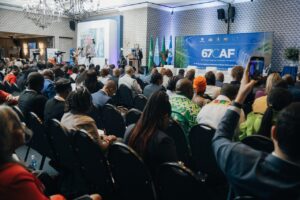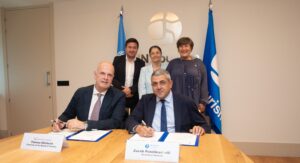Judy Kepher-Gona gives us an insight into her life as she talks to Mafalda Borea about growing up in the Rift Valley, and how she found purpose to become one of Africa’s top ecotourism experts.
1. Where did you grow up?
I grew up in Nakuru, Kenya’s Rift Valley. It’s the country’s fourth largest city after Nairobi, Mombasa and Kisumu.
2. How did a sense of environmental sustainability come into your life?
We lived close to Lake Nakuru National Park. The edge of the Park was surrounded by many kale farms walking distance from where we lived. Every so often, we heard of hippo invasions and the crop damage they made. We would also hear of buffalo and other animals scaring the farmers.
I learnt later on, in the early days of my career, that this was “crop predation”, a form of human wildlife conflict.
Despite growing up next to the Park, I never had a chance to visit it until I graduated from college and joined the Kenya Wildlife Service. Back then we all knew that the park was for “Mzungus” – white foreigners.
A sense of sustainability, in general, came into my life when I joined Kenya Wildlife.
It was there that I was exposed to the first real complaints from communities regarding the human/wildlife conflict. I also became more aware of issues of access, benefits and rights of communities living adjacent to National Parks.
While at Kenya Wildlife Service, I had a chance to be part of a team that organized the first ecotourism conference in Africa. This conference was hosted by Kenya Wildlife Service in Nairobi, Kenya, in 1998, in collaboration with The International Ecotourism Society (TIES) and Ecotourism Kenya. I was part of the team that put together the program, invited speakers and managed the actual conference.
The discussions, the insights and meeting visionary ecotourism champions changed my perspective of tourism, conservation and the plight of host communities in tourism forever. I found purpose. I made a resolution to champion ecotourism. Soon after this conference, I joined Ecotourism Kenya as CEO and like they say, the rest is history.
Over the years, my perspectives of environmental sustainability have been shaped by new and emerging knowledge on this ever evolving theme.
3. Which long standing sustainability practice or habit has significantly improved your life?
Sustainable consumption. I am very aware of wasteful consumption in all forms. Whether it’s about creating unnecessary waste from packaging and wrapping material, or choosing between baths/showers and time taken. I don’t pick printed promotional material distributed in tourism events, I would rather buy a book instead.
4. Is there a new one you are cultivating now?
Yes. Carbon miles. Considering carbon footprint of things that I consume. From food in restaurants to gifts I share.
5. Which environment or nature oriented podcast would you recommend and why?
The only podcast I follow, the Voyages Afriq Tourism Podcast.
6. Which book(s) would you recommend to people who want to be more environmentally conscious and “become the change they want to see in the world” (Ghandi)?
There are many great books on environmental consciousness, one needs to constantly update our libraries. For me it is not just about one book, it is more about the practices in general. There is a great book on Environmental impacts of ecotourism by Ralf Buckley that has everything you need to understand footprints of different travel adventures.
7. Whose environmental or conservation work do you most admire?
The late Nobel Laurette Professor Wangari Mathai. She said- you don’t need a diploma to plant a tree” She also said, “when you have cut down the last tree, and the last river has dried, you will realize that you cannot eat our money. She looked at environmental management as key to addressing poverty. Holds true for Kenya and many other places I believe.
8. Which internet resource would you recommend that you find consistently helpful and beneficial?
SKIFT.com for news, research, and marketing services for the travel industry.
9. Is there anything you try to keep in mind each day with regard to environmental sustainability?
That there are 7 billion of us in one planet. That natural resources are finite and there is no planet B, so we must consume and produce responsibly.
10. Which environmental change would you most like the next generation to experience?
Reversed global warming.
11. What is the best advice you ever had on sustainability or the environment, and who gave it to you?
Standing up for environment and sustainability is not a job. It is a calling and happens when you find purpose. Choosing sustainability and environment is to go against the wind. It can be lonely and tough, you need commitment and passion. These are all great lessons from the life and times of late Prof Wangari Mathai.
12. What is the best way to captivate the next generation on the topic of sustainability?
Engage them in current affairs by creating safe spaces for them to have a voice, engage and act.
13. Which current sustainability stories give you the most hope?
Stories of community assets, both cultural and natural, that are available for tourism. Knowing that they are being valued and that those same communities are entering the tourism supply chain not just as beneficiaries but also as suppliers.
14. Which aspect of nature, or which animal, gives you the greatest sense of awe?
Giraffes in bushes in the savannah. They are graceful. In my world, they communicate tranquillity and beauty of nature.
15. What was the most impactful, transformative or enriching travel experience of your life so far, and why?
In Madagascar, Tsara Komba, an investor, helped a community that had lived as squatters on the land he was offered for investment. He helped them to get rights and title to that same land and helped them rebuild dignified lives on the island giving them access to paths, graveyards and banana plantations. I have had many travel experiences, been an assessor for sustainability in top end destinations and lodges in Eastern & Southern Africa, but nothing beats the experience of seeing people whose dignity was restored by a tourism project.
16. Where will you be going next on your travels?
Masai Mara. Because there are happy people projects that I care for in Mara and I have not been there since the beginning of the pandemic
17. What are your favourite two ‘Sustainable Development Goals’ and why?
SDG 1: To end poverty in all its forms, everywhere. When people are economically empowered we can achieve respect for the environment and other human rights, we can have equal and meaningful partnerships and reduce dependency on land.
SDG 12: To ensure sustainable consumption and production patterns. Because it is the foundation of all the environment SDGs.
Judy Kepher-Gona, is the founder of Sustainable Travel and Tourism Agenda(STTA), a Pan African organisation shaping a sustainable future for Africa’s tourism.
The interviewer, Mafalda Borea is Voyages Afriq’s Sustainability Editor and the CEO of Sustainable First.








